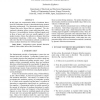Free Online Productivity Tools
i2Speak
i2Symbol
i2OCR
iTex2Img
iWeb2Print
iWeb2Shot
i2Type
iPdf2Split
iPdf2Merge
i2Bopomofo
i2Arabic
i2Style
i2Image
i2PDF
iLatex2Rtf
Sci2ools
107
click to vote
ICASSP
2011
IEEE
2011
IEEE
Linearization ability evaluation of nonlinear filters employing dynamic distortion measurement
In this paper, the compensation ability of nonlinear distortions for loudspeaker systems is demonstrated using dynamic distortion measurement. Two linearization methods using a Volterra filter and a Mirror filter are compared. The conventional evaluation utilizes swept multi-sinusoidal waves. However, it is unsatisfactory because wideband signals such as those of music and voices are usually applied to loudspeaker systems. Hence, the authours use dynamic distortion measurement employing a white noise. Experimental results show that the two linearization methods can effectively reduce nonlinear distortions for wideband signals.
Dynamic Distortion Measurement | ICASSP 2011 | Linearization Methods | Nonlinear Distortions | Signal Processing |
Related Content
| Added | 21 Aug 2011 |
| Updated | 21 Aug 2011 |
| Type | Journal |
| Year | 2011 |
| Where | ICASSP |
| Authors | Yoshinobu Kajikawa |
Comments (0)

